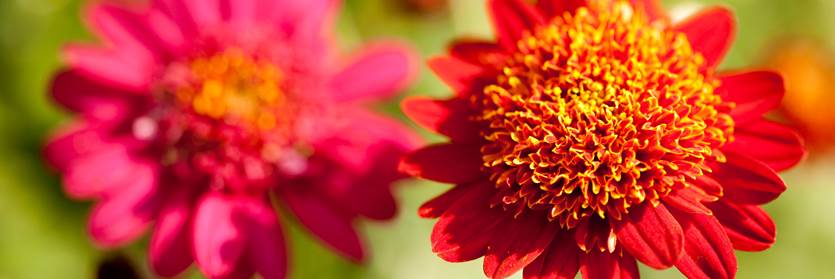Inside The New York Botanical Garden
Esther Jackson
Posted in From the Library on December 22 2016, by Esther Jackson
Esther Jackson is the Public Services Librarian at NYBG’s LuEsther T. Mertz Library where she manages Reference and Circulation services and oversees the Plant Information Office. She spends much of her time assisting researchers, providing instruction related to library resources, and collaborating with NYBG staff on various projects related to Garden initiatives and events.
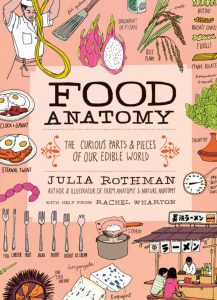 Food Anatomy: The Curious Parts & Pieces of Our Edible World is a delight for those who love food, history, or illustrated dictionaries. If you love all three, you will be in for a treat indeed!
Food Anatomy: The Curious Parts & Pieces of Our Edible World is a delight for those who love food, history, or illustrated dictionaries. If you love all three, you will be in for a treat indeed!
Over the past couple of months, I have developed an interest in graphic novels related to food. When I saw that Julia Rothman, author of Farm Anatomy and Nature Anatomy had written a book about food (with help from food writer Rachel Wharton), I was extremely excited.
Food Anatomy is charming and eclectic. Readers can move through the book from cover to cover, or open at random to a section. Chapter titles include “Food for Thought,” “Eat Your Fruits and Veggies,” “A Grain of Truth,” “The Meat of the Matter,” “Dairy Queens,” “Street Food,” “Season to Taste,” “Drink Up,” and “Sweet Tooth.” The book contains historical facts about different food, simple instructions about how different well-known staples are prepared, and explains food-related terminology. There is information about food preparation and utensils in various cultures, and the “staples” that are explained range from pasta to sushi to pancakes. While this isn’t really a cookbook, there are some recipes included.
Read More
Posted in From the Library on December 19 2016, by Esther Jackson
Esther Jackson is the Public Services Librarian at NYBG’s LuEsther T. Mertz Library where she manages Reference and Circulation services and oversees the Plant Information Office. She spends much of her time assisting researchers, providing instruction related to library resources, and collaborating with NYBG staff on various projects related to Garden initiatives and events.
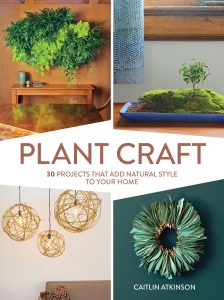 Plant Craft: 30 Projects That Add Natural Style to Your Home is perfect for the indoor gardener looking for new and creative interior decorating projects using plants. While many of the projects are rather ambitious, author Caitlin Atkinson presents each of the 30 tasks very clearly and carefully. Each project includes a materials list, a tools list, and detailed instructions accompanied by photographs for each important step.
Plant Craft: 30 Projects That Add Natural Style to Your Home is perfect for the indoor gardener looking for new and creative interior decorating projects using plants. While many of the projects are rather ambitious, author Caitlin Atkinson presents each of the 30 tasks very clearly and carefully. Each project includes a materials list, a tools list, and detailed instructions accompanied by photographs for each important step.
Projects range in complexity from creating clay plants for a cactus garden to constructing a planter inside of a wooden bench. There is also a brief section at the start of the book related to houseplant care as well as a plant list of the species and genera of plants used in the book. Experienced home crafters will draw inspiration from the creative projects Atkinson shares, while novice home-decorators can find success with smaller, less ambitious exercises.
Read More
Posted in From the Library on December 12 2016, by Esther Jackson
Esther Jackson is the Public Services Librarian at NYBG’s LuEsther T. Mertz Library where she manages Reference and Circulation services and oversees the Plant Information Office. She spends much of her time assisting researchers, providing instruction related to library resources, and collaborating with NYBG staff on various projects related to Garden initiatives and events.
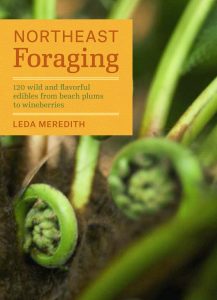 Foraging wild edibles is a lifestyle trend that can’t be ignored. If you’re looking for some guidance about foraging plants, the books below may be just the introduction you are looking for.
Foraging wild edibles is a lifestyle trend that can’t be ignored. If you’re looking for some guidance about foraging plants, the books below may be just the introduction you are looking for.
When learning a new plant in the field, one of the first questions I usually ask is, “Is this edible?” When my botanist companion happens to be there, his answer is typically, “You can eat it,” sometimes followed by a statement about the plant in question not being very tasty, and perhaps that it contains known carcinogens. As a result, I don’t tend to do a lot of foraging. While the practice intrigues me, it also brings to mind a slew of questions. What part of a plant can I eat? What about look-alike plants that are poisonous? How much can I (or should I) gather from a native plant population? Should I forage native plants at all?
Read More
Posted in From the Library, Shop/Book Reviews on December 6 2016, by Esther Jackson
Esther Jackson is the Public Services Librarian at NYBG’s LuEsther T. Mertz Library where she manages Reference and Circulation services and oversees the Plant Information Office. She spends much of her time assisting researchers, providing instruction related to library resources, and collaborating with NYBG staff on various projects related to Garden initiatives and events.
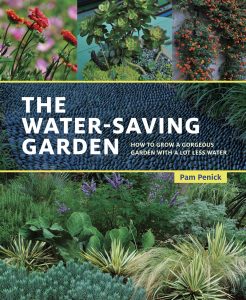
Gardening with less water and drought-resistant plants is currently a relatively hot (but not dry) topic in the world of horticulture. Two new books, The Bold Dry Garden by Johanna Silver (with Timber Press) and The Water-Saving Garden by Pam Penick (with Ten Speed Press) address this topic in very different ways.
The Water-Saving Garden is an all-around excellent book for those who already have existing gardens or who are in the process of designing and/or installing new gardens and are looking for water-saving landscape design ideas. Not so much a how-to guide as it is inspirational, this book offers practical advice and projects for garden designers and home-owners alike. The projects suggested are very modular, and even those who don’t have a lot of space to work with or redesign may find inspiration The truly inspired will find enough projects to redesign an entire yard or property.
In many cases, especially when hardscaping is concerned, supplemental reading would be needed to complete the suggested projects. Ultimately, Water-Saving is a very nice introduction to some possible water-saving projects for the gardener.
Read More
Posted in From the Library on November 29 2016, by Esther Jackson
Esther Jackson is the Public Services Librarian at NYBG’s LuEsther T. Mertz Library where she manages Reference and Circulation services and oversees the Plant Information Office. She spends much of her time assisting researchers, providing instruction related to library resources, and collaborating with NYBG staff on various projects related to Garden initiatives and events.
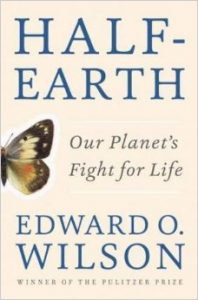 Half-Earth: Our Planet’s Fight for Life is the newest book from acclaimed biologist E. O. Wilson. In addition to Half-Earth, Wilson has authored dozens of books. Unsurprisingly, Half-Earth has echoes of Wilson’s other environmental works. With that in mind, this new book is still a very good stand-alone book about environmentalism, biology, and natural resources. It’s written accessibly both for those working in the sciences and for non-scientists who are eager to learn more about environmentalism and conservation. Half-Earth is ultimately quite philosophical, but includes the framework of a practical call to action.
Half-Earth: Our Planet’s Fight for Life is the newest book from acclaimed biologist E. O. Wilson. In addition to Half-Earth, Wilson has authored dozens of books. Unsurprisingly, Half-Earth has echoes of Wilson’s other environmental works. With that in mind, this new book is still a very good stand-alone book about environmentalism, biology, and natural resources. It’s written accessibly both for those working in the sciences and for non-scientists who are eager to learn more about environmentalism and conservation. Half-Earth is ultimately quite philosophical, but includes the framework of a practical call to action.
Wilson writes with great conviction, and Half-Earth is replete with wonderful passages in praise of science. This is a sobering yet useful book to read when so many science writers and others are touting the value of “novel ecosystems” and downplaying the problems associated with invasive species. Wilson doesn’t sugarcoat the challenges that the environment currently faces—the Earth is in trouble in many ways, overpopulation not the least of its worries. There are no simple solutions. The first step is to be educated and informed about the world around us.
Read More
Posted in From the Library on November 21 2016, by Esther Jackson
Esther Jackson is the Public Services Librarian at NYBG’s LuEsther T. Mertz Library where she manages Reference and Circulation services and oversees the Plant Information Office. She spends much of her time assisting researchers, providing instruction related to library resources, and collaborating with NYBG staff on various projects related to Garden initiatives and events.
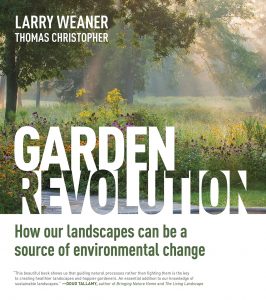 Timber Press has really been hitting the mark over the past few years with books related to landscape design, land management, and ecology. Planting in a Post Wild World, read as a landscape design manifesto, was my favorite recent book of this ilk, and Cultivating Chaos offered some truly breathtaking examples of “wild” plantings and garden design.
Timber Press has really been hitting the mark over the past few years with books related to landscape design, land management, and ecology. Planting in a Post Wild World, read as a landscape design manifesto, was my favorite recent book of this ilk, and Cultivating Chaos offered some truly breathtaking examples of “wild” plantings and garden design.
When I opened Garden Revolution, I expected a book like Post Wild World or Cultivating Chaos. In fact, Revolution looks at the same big questions of land management and ecology, but leads the reader on a rather different journey.
Read More
Posted in From the Library on November 14 2016, by Esther Jackson
Esther Jackson is the Public Services Librarian at NYBG’s LuEsther T. Mertz Library where she manages Reference and Circulation services and oversees the Plant Information Office. She spends much of her time assisting researchers, providing instruction related to library resources, and collaborating with NYBG staff on various projects related to Garden initiatives and events.
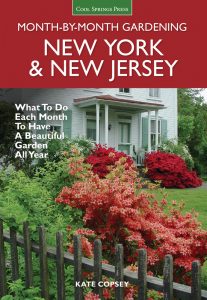 The seasonal chores related to gardening can be both a comfort and a pressure for the horticulturally inclined. This selection of recent books details various seasonal aspects of gardening, including the weather, nature journaling, and monthly chores to tackle in our area.
The seasonal chores related to gardening can be both a comfort and a pressure for the horticulturally inclined. This selection of recent books details various seasonal aspects of gardening, including the weather, nature journaling, and monthly chores to tackle in our area.
For the practical-minded, there is New York & New Jersey Month-by-Month Gardening by Kate Copsey. Do you feel like you might be forgetting a November chore? Copsey’s book shares guidance with home gardeners who love to-do lists and careful seasonal planning. New York & New Jersey Getting Started Garden Guide by Vincent Simeone is another title that can be used in tandem with Copsey’s recent publication.
Moving from to-do lists to more academic pursuits, next comes the topic of nature journaling with Flora Forager: A Seasonal Journal Collected from Nature by Bridget Beth Collins. I first came across Collins’s work through her Instagram account, where you can see her use of leaves, petals, and other natural materials to create beautiful scenes, landscapes, and animal portraits. Located in the Pacific Northwest, Collins uses materials from her garden and forages from “urban wild areas” in her neighborhood. The journal is laid out into four seasons, each one featuring a unique, full-page collage. Empty, lined pages are adorned with smaller floral pieces that repeat throughout the work. Regular visitors to the NYBG Shop might recall the notecards Collins produced with the Garden last year, now available through Collins’s website.
Read More
Posted in From the Library on November 7 2016, by Esther Jackson
Esther Jackson is the Public Services Librarian at NYBG’s LuEsther T. Mertz Library where she manages Reference and Circulation services and oversees the Plant Information Office. She spends much of her time assisting researchers, providing instruction related to library resources, and collaborating with NYBG staff on various projects related to Garden initiatives and events.
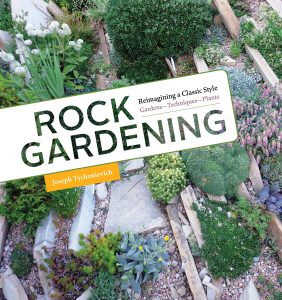 Rock Gardening: Reimagining a Classic Style is the newest book from Joseph Tychonievich, published with Timber Press. Tychonievich has previously authored Plant Breeding for the Home Gardener: How to Create Unique Vegetables and Flowers and The Complete Guide to Gardeners: The Plant Obsessed and How to Deal With Them. Organic Gardening Magazine has called him one of “six young horticulturists who are helping to shape how America gardens,” and those who move in the horticulture social media world may recognize his charming and relatable comics about plant geeks.
Rock Gardening: Reimagining a Classic Style is the newest book from Joseph Tychonievich, published with Timber Press. Tychonievich has previously authored Plant Breeding for the Home Gardener: How to Create Unique Vegetables and Flowers and The Complete Guide to Gardeners: The Plant Obsessed and How to Deal With Them. Organic Gardening Magazine has called him one of “six young horticulturists who are helping to shape how America gardens,” and those who move in the horticulture social media world may recognize his charming and relatable comics about plant geeks.
Rock gardening is back in vogue, according to this new book. For those who live in the greater NYC and Westchester regions, it may never have left entirely. Because of the rocky terrain that our region boasts, “The art of growing alpines and other miniature plants in the company of rocks to recreate the look of rugged mountaintops” is a savvy and beautiful use of space. Beyond beauty, an additional utility can be found in creating drought-tolerant plantings for water-wise gardens. Rock gardens have the potential to be sustainable and low-maintenance while still providing great color and texture. For gardeners looking for an introduction to rock gardening, Tychonievich’s book is a great start.
Read More
Posted in From the Library on October 31 2016, by Esther Jackson
Esther Jackson is the Public Services Librarian at NYBG’s LuEsther T. Mertz Library where she manages Reference and Circulation services and oversees the Plant Information Office. She spends much of her time assisting researchers, providing instruction related to library resources, and collaborating with NYBG staff on various projects related to Garden initiatives and events.
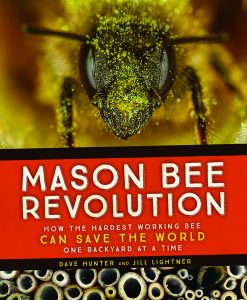 For gardeners curious about mason bees or building pollinator havens in general, Mason Bee Revolution is a lovely new book from Dave Hunter and Jill Lightner. The passion that the authors have for the topic at hand is infectious. Why keep mason bees? Compared to honey bees, it turns out that these pollinators are lower-maintenance, cheaper, and will pollinate more plants per insect than honey bees. They are also docile and child-friendly.
For gardeners curious about mason bees or building pollinator havens in general, Mason Bee Revolution is a lovely new book from Dave Hunter and Jill Lightner. The passion that the authors have for the topic at hand is infectious. Why keep mason bees? Compared to honey bees, it turns out that these pollinators are lower-maintenance, cheaper, and will pollinate more plants per insect than honey bees. They are also docile and child-friendly.
This book is filled with small projects, practical how-to information, and suggested resources from the home beekeeper. The real strength of this book is the practical, easy-to-follow instructions about setting up nesting sites and habitat for mason bees and leafcutter bees. Materials, site requirements, harvesting cocoons, and over-winter storage are all topics that the authors address. There is a lot of information, but it is easy to follow. Although the book is 154 pages there are points when the narrative meanders slightly, and there is occasional repetition.
Read More
Posted in From the Library, Shop/Book Reviews on October 24 2016, by Esther Jackson
Esther Jackson is the Public Services Librarian at NYBG’s LuEsther T. Mertz Library where she manages Reference and Circulation services and oversees the Plant Information Office. She spends much of her time assisting researchers, providing instruction related to library resources, and collaborating with NYBG staff on various projects related to Garden initiatives and events.
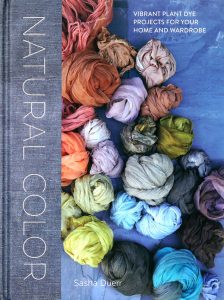 Natural Color: Vibrant Plant Dye Projects for Your Home and Wardrobe has the look of a book that is waiting to be touched. With its slightly-textured cover materials and luscious cover photo it draws the eye while subtlety hinting at the projects it contains. This book by Sasha Duerr, published with Ten Speed Press, builds in part off of her earlier publication The Handbook of Natural Plant Dyes which was published in 2010 with Timber Press.
Natural Color: Vibrant Plant Dye Projects for Your Home and Wardrobe has the look of a book that is waiting to be touched. With its slightly-textured cover materials and luscious cover photo it draws the eye while subtlety hinting at the projects it contains. This book by Sasha Duerr, published with Ten Speed Press, builds in part off of her earlier publication The Handbook of Natural Plant Dyes which was published in 2010 with Timber Press.
Natural Color opens with a gorgeous image of a passionflower (Passiflora edulis) photographed by Aya Bracket. Bracket’s photos coupled with precise and artistic page layouts make this book about practical handicraft a work of art in and of itself. Even those who have not dyed materials (and perhaps have no real desire to do so) can appreciate the beauty of this work. Duerr’s couching of her dyeing ethics within permaculture is both intriguing and accessible. One of the names associated with “slow fashion,” Duerr champions both self-sufficiency for people as well as respect for and harmony with the natural world. Many of the projects in Natural Color make use of cultivated garden plants, non-native plants that have become “weeds,” and plants that can be sustainably and responsibly harvested.
Read More
 Food Anatomy: The Curious Parts & Pieces of Our Edible World is a delight for those who love food, history, or illustrated dictionaries. If you love all three, you will be in for a treat indeed!
Food Anatomy: The Curious Parts & Pieces of Our Edible World is a delight for those who love food, history, or illustrated dictionaries. If you love all three, you will be in for a treat indeed!